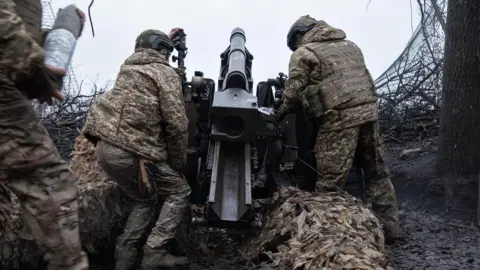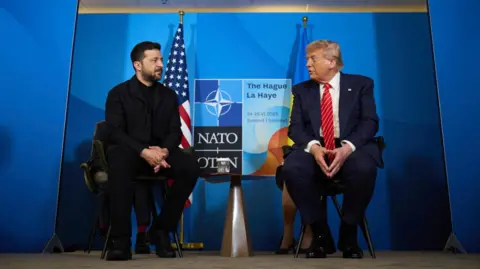Ukraine fears increased Russian aggression after US halt of weapons supply
 EPA
EPAKyiv has warned that an interruption of US weapons shipments will encourage Russia to prolong the war in Ukraine, now in its fourth year.
On Tuesday the White House said it had cut off some weapons deliveries to Ukraine.
The decision was taken "to put America's interests first" following a defence department review of US "military support and assistance to other countries", White House spokesperson Anna Kelly said.
Ukrainian President Volodymyr Zelensky said the two countries were now "clarifying all the details on supplies", while the foreign ministry warned any delays "would only encourage the aggressor to continue war and terror, rather than seek peace".
The ministry particularly emphasised the need for Kyiv to strengthen its air defences - as Russia continues to pummel the country with missiles and drones on a near-nightly basis.
A Kyiv-based US diplomat was invited to the foreign ministry for talks on Wednesday.
However, Ukraine's defence ministry said it had not received any official notification from the US about the "suspension or revision" of the weapons deliveries, and urged people not to speculate on the basis of partial information.
But in a statement the defence ministry also said the path to ending the war was "through consistent and joint pressure on the aggressor".
At the weekend Ukraine endured its biggest aerial attack since the start of Russia's full-scale invasion, with more than 500 drones and ballistic and cruise missiles launched at its cities.
US officials did not immediately say which shipments were being halted.
According to American broadcaster NBC, the weapons being delayed could include Patriot interceptors, Howitzer munitions, missiles and grenade launchers.
The US has sent tens of billions of dollars in military aid to Ukraine since Russia launched its full-scale invasion in February 2022, leading some in the Trump administration to voice concerns that US stockpiles are too low.
The Kremlin, for its part, welcomed news of the reduction in weapons shipments, saying reducing the flow of weapons to Kyiv will help end the conflict faster.
"The fewer the number of weapons that are delivered to Ukraine, the closer the end of the special military operation," Kremlin spokesman Dmitry Peskov told reporters.
Fedir Venislavskyi, an MP for Ukraine's ruling party, said the decision was "painful, and against the background of the terrorist attacks which Russia commits against Ukraine... it's a very unpleasant situation".
A Ukrainian military source quoted by the AFP news agency said Kyiv was "seriously dependent on American arms supplies, although Europe is doing its best, but it will be difficult for us without American ammunition".
Ukraine's European allies have spent billions in military aid over the last three-and-a-half years.
However, military support for Kyiv is not endorsed by everyone on the political spectrum.
Czech President and former top Nato official, Petr Pavel, has been a staunch supporter of Ukraine - but he told BBC Russian he could "not guarantee" continued ammunition support for Kyiv, as that was dependent on the result of forthcoming Czech elections.
"I don't know what will be the priorities of a new government," he said.
The Pentagon's move is based on concerns that US military stockpiles are falling too low, a source told CBS News, although Anna Kelly stressed "the strength of the United States Armed Forces remains unquestioned - just ask Iran".
Separately, the US Undersecretary of Defense for Policy, Elbridge Colby, said in a statement the Pentagon "continues to provide the President with robust options to continue military aid to Ukraine".
However, he added "the department is rigorously examining and adapting its approach to achieving this objective while also preserving US forces' readiness for Administration defence priorities".
 Reuters
ReutersThe pause comes less than a week after President Donald Trump discussed air defences with Volodymyr Zelensky at the Nato summit in the Netherlands.
Trump said US officials "are going to see if we can make some of them available" when asked by the BBC about providing extra Patriot anti-missile systems to Ukraine.
Referring to his conversation with Zelensky, Trump said: "We had a little rough times sometimes, but he couldn't have been nicer."
The two had a heated confrontation in the Oval Office in February. Afterwards, Trump said he was pausing military aid to Ukraine that had been earmarked by the previous Biden administration. Intelligence sharing with Ukraine was also suspended.
But both pauses were subsequently lifted.
In late April, the US and Ukraine signed a deal that would give the US access to Ukraine's mineral reserves in exchange for military assistance.
Meanwhile, French President Emmanuel Macron spoke with his Russian counterpart Vladimir Putin on Tuesday - the first time in over two-and-a-half years.
They spoke on the phone for more than two hours, Macron's office said, adding the French president had urged a ceasefire in Ukraine and for talks to start on a "solid and lasting settlement of the conflict".
The Kremlin said Putin had "reminded Macron" that the West's policy was to blame for the war, because it had "for many years ignored Russia's security interests".
Last month, Russia's long-time leader told a forum in St Petersburg that he saw Russians and Ukrainians as one people and "in that sense the whole of Ukraine is ours".
Moscow currently controls about 20% of Ukrainian territory, including the Crimea peninsula annexed in 2014.
Despite heavy losses, Russia has made slow, grinding advances in Ukraine in recent months and announced full control of the eastern Luhansk region this week - this has not been independently verified.
Moscow also says it has seized territory in the south-eastern region of Dnipropetrovsk - a claim denied by the Ukrainian military.
Meanwhile, on Tuesday a Ukrainian attack killed three people at a Russian arms production factory making drones and radars in Izhevsk, more than 1,000km (620 miles) from the border with Ukraine.

Follow the twists and turns of Trump's second term with North America correspondent Anthony Zurcher's weekly US Politics Unspun newsletter. Readers in the UK can sign up here. Those outside the UK can sign up here.
